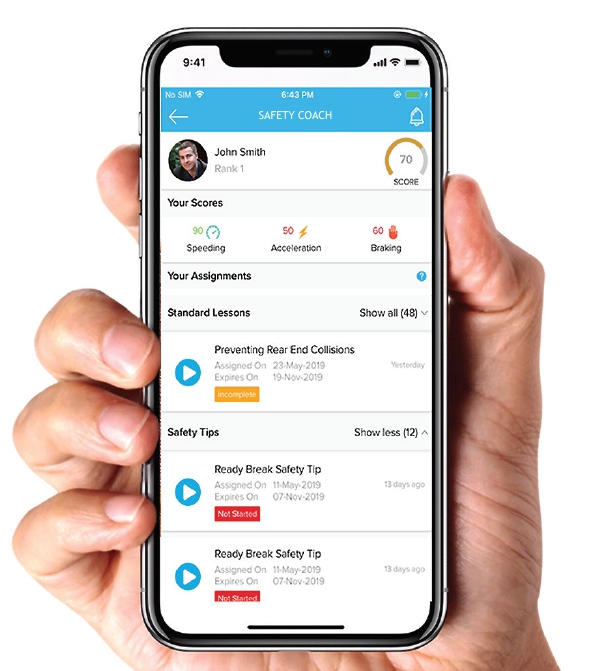When managing a fleet, safety is always a top priority. Protecting drivers, vehicles, and the public is not only a moral responsibility but also critical to maintaining operational efficiency and reducing costs. One of the most effective ways to enhance fleet safety is through GPS tracking technology. GPS tracking systems offer a range of features that help reduce accidents and promote safer driving behaviors. In fact, many fleet managers have found that they can reduce fleet accidents with GPS tracking, making it an invaluable tool for improving overall safety.
 Real-Time Monitoring
Real-Time Monitoring
GPS tracking provides real-time visibility into fleet activity. Fleet managers can monitor driver behavior and identify unsafe practices such as speeding, harsh braking, rapid acceleration, and erratic driving. Immediate alerts enable managers to address dangerous driving habits promptly, preventing potential accidents. Additionally, having real-time updates allows managers to respond quickly to road conditions or hazards, rerouting drivers as needed to avoid dangerous situations. These capabilities further demonstrate how businesses can reduce fleet accidents with GPS tracking.
Driver Behavior Analysis
GPS tracking systems collect data on driving patterns, allowing fleet managers to analyze driver performance over time. By identifying trends and recurring issues, managers can implement targeted training programs to improve driver safety. Recognizing and rewarding safe driving behavior can also motivate drivers to maintain high safety standards. Providing regular feedback based on GPS data fosters a culture of accountability and continuous improvement within the fleet.
Route Optimization
Efficient route planning is another safety benefit of GPS tracking. By optimizing routes, fleet managers can reduce driver fatigue, minimize time spent on congested roads, and avoid hazardous areas. This leads to fewer accidents caused by tired drivers or challenging driving conditions. Route optimization also helps reduce the likelihood of drivers resorting to risky shortcuts or speeding to meet deadlines, further enhancing safety.
Reducing Unauthorized Vehicle Use
GPS tracking helps prevent unauthorized use of company vehicles. When drivers know that their activities are being monitored, they are less likely to misuse vehicles for personal purposes or engage in reckless driving. This accountability contributes to overall fleet safety and helps to reduce fleet accidents with GPS tracking. Unauthorized vehicle use not only increases wear and tear on vehicles but also exposes the company to liability risks if an accident occurs during unauthorized trips.
Emergency Assistance
In the event of an accident or vehicle breakdown, GPS tracking systems enable rapid response. Fleet managers can quickly locate the affected vehicle and dispatch emergency assistance. This swift action can prevent minor incidents from escalating into major accidents and ensure drivers receive timely help. Some GPS systems even provide automatic crash detection, which can immediately alert emergency services when a severe collision is detected.
Maintenance Alerts
Proper vehicle maintenance is crucial for safety and to reduce fleet accidents. GPS tracking systems often include maintenance scheduling and alerts based on vehicle mileage or engine hours. Staying on top of maintenance helps prevent mechanical failures that could lead to accidents. Regular maintenance checks ensure that critical vehicle components, such as brakes and tires, are in optimal condition, reducing the risk of breakdowns and malfunctions on the road.
Reducing Liability and Insurance Costs
Another important aspect of fleet safety is managing liability and reducing insurance expenses. GPS tracking systems can provide detailed records of driver activity and vehicle performance, serving as valuable evidence in the event of an accident or dispute. This documentation can protect the company from false claims and demonstrate a commitment to safety, potentially lowering insurance premiums. If you’re interested in learning more about how GPS data can lower insurance premiums, please visit VeriDrive Insurance Agency.
Enhancing Driver Communication
Effective communication between drivers and fleet managers is vital for safety. GPS tracking systems often include messaging features that allow managers to relay important information to drivers in real-time. Whether it’s a weather alert, traffic update, or safety reminder, keeping drivers informed helps them make better decisions on the road.
Investing in GPS tracking technology is an investment in fleet safety. By leveraging real-time data, promoting responsible driving habits, ensuring timely maintenance, and enhancing communication, fleet managers can significantly reduce the risk of accidents. When you reduce fleet accidents with GPS tracking, you not only protect your drivers but also safeguard your company’s bottom line. At Smart Fleet, we understand the importance of safety and offer advanced GPS tracking solutions tailored to meet your fleet’s needs. Contact us to learn more about how we can help you put fleet safety first or schedule a meeting today!
To learn more about Smart Fleet, check out some of our other recent blogs:
How Weather Affects Fleet Operations
Telematics Connected Insurance: Smart Fleet and VeriDrive Insurance Agency
Importance of Asset Trackers: Protecting and Optimizing Your Fleet Investments
